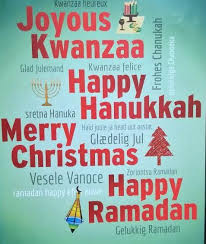For weeks now, Americans have been bombarded with songs, images, and marketing geared toward the celebration of Christmas. We don’t often hear about them, but there are two other holidays – celebrated worldwide by many millions of people – that also fall in December.
The name of one of these holidays, Hanukkah, may be familiar to all, but its history and meaning remain mysterious to many. Two thousand years ago, the Jewish people lived in Jerusalem where they built a glorious temple of worship. Contrary to the times, the Jews believed in the existence of one god and they didn’t recognize the sovereign power of kings. This was a major problem when Alexander the Great conquered the Persian Empire in 336 B.C. and put the Jews under Syrian rule that was intolerant of Jewish beliefs.
In 168 B.C. when Antiochus Epiphanes tried to force them to worship him as their god, the steadfast and determined Jews refused to acknowledge him as their king. In retribution, Antiochus destroyed the temple, defiled the altars and killed many of his resistors. He dedicated the temple to the worship of Zeus. Undefeated and angered by further atrocities, a Jewish peasant named Mattathias killed a Syrian soldier and took to the mountains with his five sons. There the family, called the Maccabees, formed a guerrilla army and began years of reprisals against the Syrian soldiers.
Three years later, the victorious Maccabees reentered Jerusalem and found their precious temple in ruins. After a great deal of cleaning and repair work, the Maccabees were ready to rededicate the temple to the Jewish people. On the 25th day of the Kislev (December), they relit the temple’s eternal light. Miraculously, the light continued to burn for eight days and nights in spite of the fact that they only had one day’s supply of oil. Every year since, Jewish people have celebrated this Festival of Lights during Hanukkah (which means dedication in Hebrew).
The menorah, with its eight candles, represents the story of the eight miraculous days of light in the temple. An additional candle is lit by the Shamash (the center candle) each night at sunset and a blessing recited. By the eighth night, all nine candles burn with a glorious light. Families celebrate with special games, gift giving and traditional foods. This year, millions of Jewish families around the world will celebrate the victory of faith over tyranny when Hanukkah began at sundown on December 12. It ends on December 20.
Celebrated by 15 million people of African descent worldwide, Kwanzaa is steadily finding its way into the American consciousness. More a cultural than a religious holiday, Kwanzaa is celebrated by Africans and African-Americans of all religious faiths and backgrounds. As the African-American struggle for identity and freedom intensified in the 1960s, Dr. Maulana Karenga, a professor and community leader, developed the idea of a holiday that would offer African-Americans an opportunity to acknowledge and celebrate their rich heritage.
Beginning on December 26 and lasting through New Year’s Day, Kwanzaa celebrations seek to connect African-Americans to their cultural identity. Each day is an opportunity to reflect on one of the Seven Principles that have sustained Africans throughout history: unity, self-determination, collective work and responsibility, cooperative economies, purpose, creativity, and faith. More than a once a year celebration, Kwanzaa is meant to reinforce a way of life and offer a chance to remember the past, reassess the present, recommit to a better future and rejoice in a renewed sense of community.